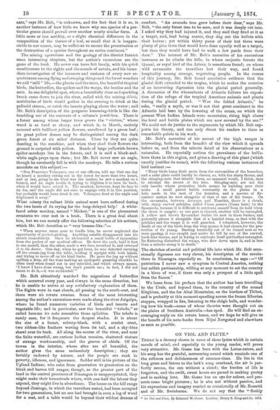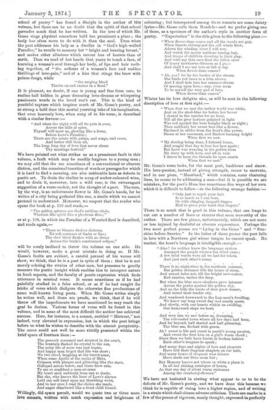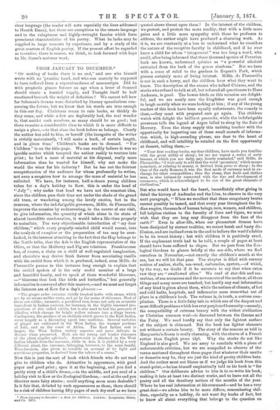ON VIOL AND FLUTE.*
THERE is a dreamy charm in some of these lyrics which in certain moods of mind, and especially to the young reader, will prove
very attractive. Mr. Goose has been with the Lotus-eaters, and his song has the grateful, murmuring sound which reminds one of the softness and deliciousness of summer-time. He lies in the long grass and listens to the lark's song overhead, the air is per- fectly serene, the sun without a cloud ; the burden of life is forgotten, and the swift, sweet hours are passed in making poetry and in making love. Mr. Gosse has an eye for colour, and pre- sents some bright pictures ; he is also not without passion, and
his expressions and imagery remind us occagionmlly of Mr- Rossetti and of Mr. Swinbnrne. We do not say that the 4' fleshly * On rgoi and Rate. By Edmund W. House. London; Henry S. King and Co. 1873.
school of poetry" has found a disciple in the author of this volume, but there can be no doubt that the spirit of that school pervades much that. he has written. In the love of which Mr.
Gosse sings physical sensations bold too prominent a place ; the body has often more to do with it than the soul. Even when the poet addresses his lady as a dweller in "God's high-walled Paradise," he recalls to memory her "bright and heaving breast," and makes other allusions which savour lees of heaven than of earth. Then we read of hot hands that yearn to touch a face, of learning a woman's soul through her body, of lips and hair melt- ing together, of "the ardours of a woman's face and sudden thrillings of love-pain," and of a kiss that stings the brow with poison-fangs, while "the surging blood Throbs on and rushes in a flood."
It is pleasant, no doubt, if one is young and free from care, to
recline half hidden in grass dreaming love-dreams or whispering passionate words in the loved one's ear. This is the kind of youthful rapture which inspires much of Mr. Gosse's poetry, and so strong a hold does this mortal yearning take of his imagination, that even heavenly love, when sung of in his verse, is described with a similar fervour :—
"And when the night with all its pain is over,
Across the hills of spice, Thyself will meet us, glowing like a lover, Before Love's Paradise ; There are the saints with palms, and songs, and roses, And better still than all, The long, long day of love that never closes Thy marriage festival."
We have pointed out what strikes us as a prominent fault in this volume, a fault which may be readily forgiven to a young man ; we may add that the use sometimes of a conventional or obscure diction, and the occasional insertion of words or passages for which
it is hard to find a meaning, are also noticeable here as defects in
poetic art. To drain the chalice in scup of amber-coloured wine, and to drain it, moreover, into a wild rose, is the extravagant suggestion of a verse-maker, not the thought of a poet. The rose, by the way, is an unfortunate flower in Mr. Gosse's hands, for he writes of a city being gathered like one, a simile which we cannot pretend to understand. Moreover, we suspect that the reader who opens the book at p. 119 and reads,—
" The golden spheres are God's sublime citole, Whereon His spirit like a plectrum flies ; "
or at p. 108, in which the Paradise of a Wearied Soul is described, and reads again,—
" There no bizarre desires distress, No soft contours of limbs or lips; The slow blood flushes with no stress
Across the brain's constrained eclipse," will be sorely inclined to throw the volume on one side. He would, however, make a great mistake in doing so. If Mr.
Gosse's faults are evident, a careful perusal of his verses will show, we think, that be is a poet in spite of them ; that he is not merely echoing the strains of other men, but possesses in goodly measure the poetic insight which enables him to interpret nature in fresh aspects, and the faculty of poetic expression which finds utterance in musical verse. It seems sometimes as if he had painfully studied in a false school, or as if he had caught the tricks of verse which disfigure the otherwise fine productions of some well-known living poets. When Mr. Gosse writes simply he writes well, and there are proofs, we think, that if he will throw off the impediments we have mentioned he may reach the goal he desires. Various forms of verse will be found in this volume, and in some of the most difficult the author has achieved success. Here, for instance, is a sonnet, entitled "Mistrust," not indeed, very elevated in expression, but in which the poet brings before us what he wishes to describe with the utmost perspicuity. The scene could not well be more vividly presented within the brief space of fourteen lines :—
The peacock screamed and strutted in the court,
The fountain flashed its crystal to the sun, The noisy life of noon was just begun, And happy men forgot that life was short ; We two stood, laughing at the turret-pane, When some Apollo of the ranks of Mars, Crimson with plumes and glittering like the stars, Galloped across below, and there drew rein.
To see so confident a man-at-anus My heart sank suddenly from sun to shade, But she, who knows the least of Love's alarms - Laid one soft hand upon my throbbing wrist, And in her eyes I read the choice she made, And anger slumbered like &tired child kissed.
Willingly, did space permit, would we quote two or three more love sonnets, written with much expression and brightness of, colouring; but interspersed among these sonnets are some dainty lyrics—Mr. Gosse calls them Rondels—and We prefer giving one of these, as a specimen of the author's style in another form of poetry. "Expectation" is the title given to the following piece :—
" When flower-time comes and all the woods are gay,
When linnets chirrup and the soft winds blow,
Adown the winding river I will row,
And watch the merry maidens tossing hay, And troops of children shouting in their play.
And with my thin oars flout the fallen snow
Of heavy hawthorne-blossom as I go,— And shall I see my love at fall of day
When flower-time comes?
" Ah, yes ! for by the border of the stream She binds red roses to a trim alcove, And I shall fade into her summer-dream Of musing upon love,—nay, even seem To be myself the very god of love, When flower-time comes."
Winter has its love delights also, as will be seen in the following description of love at first sight :—
" When first we met the nether world was white, And on the steel-blue ice before her bower I skated in the sunrise for an hour,
Till all the grey horizon gulphed in light Was red against the bare boughs black as night ; Then suddenly her sweet face like a flower, Enclosed in sables from the frost's dim power, Shone at her casement, and flushed burning bright When first we met.
"My skating being done, I loitered home, And sought that day to lose her face again ; But Love was weaving in his golden loom My story up with hers' and all in vain I strove to loose the threads he spun amain When first we met.'
Mr. Gosse's verse lacks, for the most part, backbone and sinew. His love-passion, instead of giving strength, seems to enervate, and in one piece, "Moorland," which contains, some charming lines, he seems to be addressing a man—but it is possible we are mistaken, for the poet's Muse has sometimes dim ways of her own which it is difficult to follow—in the following strange fashion :—
" Only just to touch your hair Is as much as I can bear,
Or with clinging, languid fingers Half to press your hand that lingers."
There is so much that is good in this volume, that one longs to. cut out a number of lines or stanzas that seem unworthy of the author. There are few pieces, unfortunately, which are not more or less injured by doubtful or obscure expressions. Perhaps the two most perfect poems are "Lying in the Grass" and "Sun- shine before Sunrise." In the latter of these poems the poet falls in love with a Northern girl whose tongue he cannot speak. No matter, the heart's language is intelligible enough :—
" Alas ! for neither knew the language spoken Amongst the people whence the other came; A few brief words were all we had for token, And just each other's name.
. . ..... . There is no night-time in the northern summer, But golden shimmer fills the hours of sleep, And sunset fades not, till the bright new-comer, Red sunrise, smites the deep.
But when the blue snow-shadows grew intenser Across the peaks against the golden sky, And on the hills the knots of doer grew denser, And raised their tender cry, And wandered downward to the Lap-men's dwelling, We knew our long sweet day was nearly spent, And slowly, with our hearts within us swelling, Our homeward steps we bent.
..... . . And very late we saw before us, dreaming, The red-roofed town where all her days had been, And far beyond, half shaded and half gleaming, The blue sea, flecked with green.
Ah ! sweet is life and sweet is youth's young passion,. And sweet the first kiss on a girl's warm cheek ; Since then we both have learnt in broken fashion Each other's tongues to speak ; And many days and nights of love and pleasure Have laid their fragrant chaplets on our hair, And many hours of eloquent wise leisure Have made our lives seem fair ; .
But Memory knows not where so white a place is In all her shining catalogue of hours, As that one day of silent warm embraces Among the cranberry-flowers."
We have not hesitated in stating what appear to us to be the defects of Mr. Gosse's poetry, and we have done this because we think he is capable of rising into a higher region, and of writing in a strain which shall silence adverse criticism. There are marks in a few of the poems of vigorous, manly thought, expressed in perfectly clear language (the reader will note especially the lines addressed to Henrik Ibsen), but these are exceptions to the ornate language and to the voluptuous and highly-wrought fancies which form prominent characteristics of his poetry. What he lacks may be supplied in large measure by experience, and by a study of the great masters of English poetry. If the present effort be regarded as tentative, there is reason, we think, to look forward with hope to Mr. Gosse's maturer work.












































 Previous page
Previous page